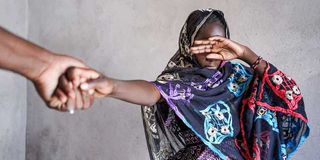Shattered dreams: Tales of Somali child brides trafficked to Kenya

What you need to know:
- A survivor, now a mother of four before her 21st birthday, arrived in the country seven years ago.
- She was surprised to learn that child marriage is a crime, and wishes that she had an opportunity to go to school in her home country.
Seven years ago, Astur Barwaqo* was a child living in Badhaadhe, Somalia. She was 14, orphaned and a pupil at a local madrassa that also happened to be her uncle's home.
It was in that setup that she was introduced to her husband, 63-year-old Ahmed Khali*, who would visit the uncle with goodies for the children at the madrassa.
“Everybody wants to come to Kenya from Somalia. I wanted to come and see this country that I could see on TV when I peeped through a neighbour’s window,” Astur says.
She had seen Ahmed several times. He was nice to her. He also promised that one day he would bring her to Kenya. The day came, but the ticket had a price tag attached to it. The uncle called and explained to her that she was the item of trade.
“I was told that I was his (Ahmed’s) wife and that the nikah (marriage) ceremony was fixed for the following day, and if I accepted, I would go to Kenya. It was a moment of mixed feelings, but coming to Kenya won,” she narrates.
Low-key ceremony
The ceremony took place at the madrassa, attended by a few people so as not to create much attention. On the same day, she was taken to a place, where she sojourned.
She had lived with Ahmed for four months when she learned she was pregnant. In the fifth month, they moved to Liboi, where he left her with a helper as he travelled to Garsen to make arrangements for her.
“I can't remember who the people he left me with were, but they took care of me and handed me over to another couple who took me to Garissa.”
A month later, she delivered a baby boy at a local dispensary, and seven days after, Ahmed returned for her. It was also her 15th birthday.
September will mark her seven years in Kenya and just a month to her 21st birthday. She is now a mother of four. She has learned a little Kiswahili, but that does not worry her because she has lots of friends with whom she speaks Somali.
Tip of the iceberg
“I'm not the only one who crossed to Kenya that way, there are some in this village who came way before me; they are aged. Some came recently. It seems easier for children than for adults.”
She reveals the tricks some of her friends used to cross over: appealing to the emotions of the soldiers manning the border.
“As a child, you just run to the border crying for help, cook a story because they hear our language, or someone is always there to translate, and they will take you to a safe place, where your husband waits for you.”
What has shocked her, however, is the number of schoolgirls older than her, and the fact that marriage at her age is a criminal offence.
She wishes that such rules would apply in Somalia and that she could get such a chance to be in school when she was a child.
“We are married so young, even at 13. The mother of your husband becomes your manual in marriage to build you into womanhood. It is believed that a woman who has too much Western education is already defiled and unfit for marriage,” she explains.
Empowered women
A similar notion is held by most men from pastoralist communities in Kenya, hence the large number of single educated women from such areas. According to human right activist Yasmin Hassan, men are intimidated by learned women, thus malign them just to trample on their pride.
“It is a trend locally; they call learned women prostitutes, and that if tolerated, inspires child marriage, which is wrong regardless of their perspectives.”
According to Yasmin, the government is sometimes complacent, and that has encouraged many men to cross the border and traffic in children to make them wives. She says many such cases are in North-eastern counties.
Yasmin has called on the government to tighten its migration and registration rules to ensure vulnerable children from other countries are not exploited.
Survivor protection
Tana River County children's officer Peter Kieti, notes that child marriage is not permitted regardless of a person’s nationality.
“A child in Kenya is treated like a Kenyan citizen. Therefore, once on Kenyan soil, that child is protected by Kenyan laws. How I wish we can get a mechanism in place to escalate such cases and arrest them before it’s too late.”
He says trafficking in children to make them wives is categorised under the facilitation of sex tourism and child prostitution, which has a prescribed punishment of not less than 10 years in jail and a fine of Sh2 million.
According to the 2022 Trafficking in Persons report, the government identified 482 victims of trafficking from neighbouring countries, 326 of whom were girls. The report notes most of the survivors rescued are also victims of child prostitution and forced labour.
*Names changed to protect the identity of the child marriage and trafficking survivor. A stock image has also been used for the purpose of illustration. It does not represent the character in this article.





